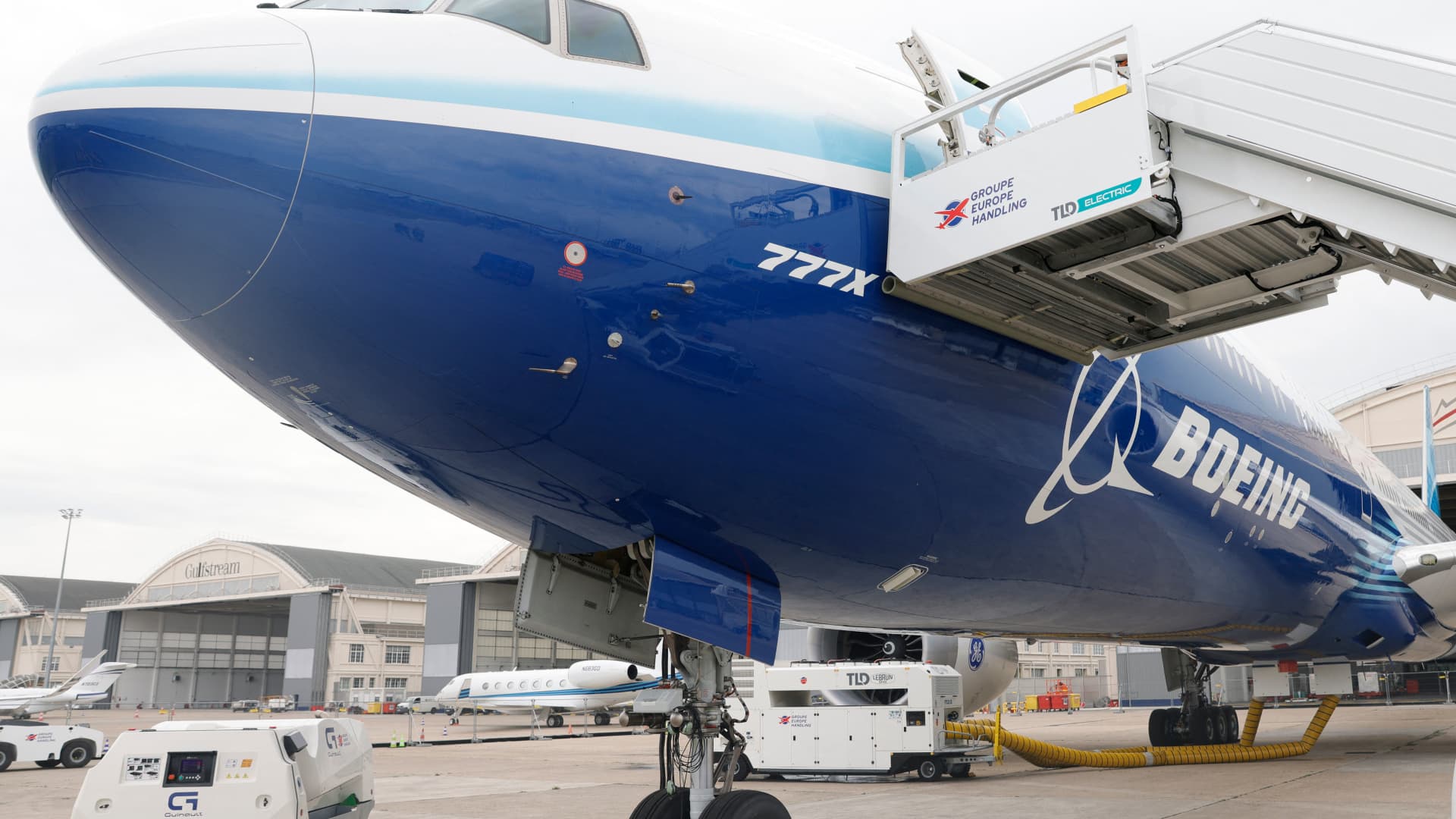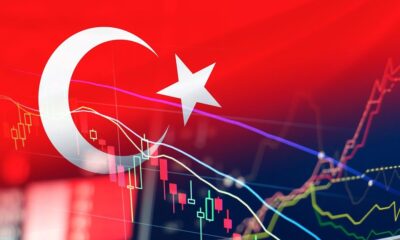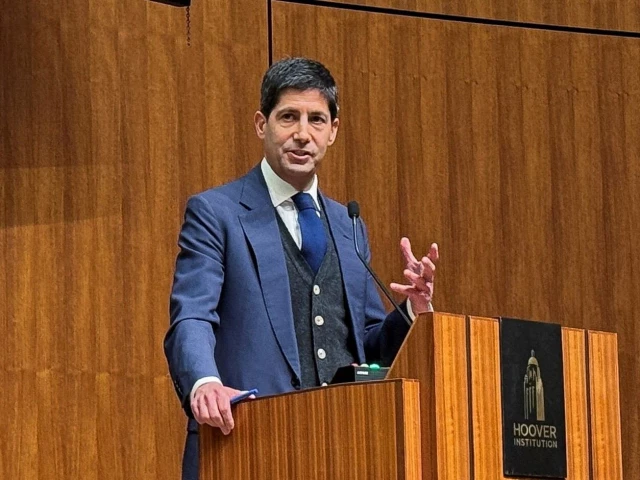Business
Boeing stems cash burn for first time since 2023 but takes $4.9 billion charge on 777X delays

A Boeing 777x is displayed during the International Paris Air Show at the Paris-Le Bourget Airport on June 20, 2023.
Geoffroy Van Der Hasselt | AFP | Getty Images
Boeing said Wednesday its jetliner deliveries drove it back into cash-positive territory for the first time in nearly two years, but it took a $4.9 billion charge on additional delays of its long-awaited 777X wide-body plane.
Boeing is on track to deliver the most aircraft this year since 2018, before two crashes grounded its bestselling jetliner, the Covid pandemic hit supply chains and a host of manufacturing crises drove years of losses at the top U.S. exporter.every
CEO Kelly Ortberg, an aerospace veteran who came out of retirement to helm Boeing in August 2024, has worked to steady the manufacturer’s sprawling supply chain and cash-generating production lines.
The 777X, an updated version of its 777 plane, took its first flight nearly six years ago but still hasn’t won regulator approval. Boeing said it now expects the first delivery in 2027, leading to the noncash charge.
Boeing CFO Jay Malave told analysts that questioned why the charge on the program was so high that slower production rates and holding onto planes longer for rework added to costs.
“The team is just not going to sit here and take this lightly and hasn’t taken it lightly,” Malave said. “They are focused — we are all focused on doing everything we can to improve the long-term productivity on this program, while also working to mitigate the total delay impact to our customers the best we can.”
Boeing stock fell 4% on Wednesday, though it is still up more than 20% so far this year.
A Boeing 777x aircraft during an aerial display on the opening day of the Farnborough International Airshow in Farnborough, UK, on Monday, July 18, 2022.
Jason Alden | Bloomberg | Getty Images
“While there’s still more work to do to advance our development programs, particularly on our commercial development and certification programs, we’re seeing positive signs across our business, and I’m proud of how we are coming together to turn our company around,” Ortberg said in a staff note.
Still, Boeing generated free cash flow of $238 million, its first time in the black on that metric since late 2023.
The company lost $4.78 billion, or $7.14 a share, in the three months ended Sept. 30. That’s better than a $5.76 billion loss a year earlier. On an adjusted basis, the company reported a loss of $7.47 a share. Revenue jumped 30% to $23.27 billion for the third quarter, up from $17.84 billion a year ago and ahead of analysts’ estimates.
A year ago, Boeing machinists were on strike in a contract impasse that crippled production at the majority of the company’s commercial airplane factories.
Here’s how Boeing performed for the third quarter compared with analysts’ estimates compiled by LSEG:
- Loss per share: $7.47 per share adjusted vs. a loss of $4.59 expected
- Revenue: $23.27 billion vs. $21.97 billion expected
Airline customers have said they’ve seen an improvement at Boeing, with more accurate delivery projections, a change in tune from the complaints of prior years.
In the first nine months of the year, Boeing delivered 440 airplanes, up from 291 in the same period last year. Airlines and other customers pay for the bulk of the planes when they receive them, so increasing the delivery pace is key for Boeing to stem an outflow of cash totaling close to $17 billion since the start of 2024 through June of this year.
Last year was supposed to be a turnaround year for Boeing, but a midair blowout of a door panel in January 2024 resulted in a near catastrophe and increased federal scrutiny that slowed production.
But Boeing has made progress. Earlier this month, the Federal Aviation Administration lifted a production cap for Boeing’s 737 Max to 42 a month from 38, a restriction it put in place after the accident. Ortberg said the company will increase production beyond that level when it has FAA approval.
The FAA is also now allowing Boeing to perform final sign-offs on some of its aircraft, a sign of increased confidence from its regulator.
Boeing’s commercial unit revenue rose 49% from a year earlier to $11.09 billion, though it still had negative operating margins. Its defense unit generated $6.9 billion, up 25% from last year in the third quarter, with a 1.7% operating margin, while its profitable global services business brought in nearly $5.4 billion, a 10% increase.
The company isn’t out of the woods. Its Max 7 and Max 10 variants and the 777X are years behind schedule.
“Pencils are down from a design perspective” on an anti-icing system for the two Max variants, the largest and smallest of the family, Ortberg told CNBC’s “Squawk on the Street” on Wednesday. “We know what hardware and software changes are needed to the airplane.”
He said Boeing is now working through certification with the FAA.
Additionally, about 3,200 of its defense unit workers who make F-15 fighter jets and missile systems have been on strike since the summer as the two sides have yet to reach a new contract.
Business
D-St blues! Sensex sheds 1.5K, biggest drop on a Budget day – The Times of India

At a time when global markets are witnessing high volatility due to geopolitical uncertainties, the hike in securities transaction tax (STT) on derivatives trades hit investor sentiment on Dalal Street on the Budget day. This in turn led to a sharp sell-off that pulled the sensex down by nearly 1,500 points—its biggest points loss on a Budget day—to close at 80,773 points. The sell-off also left investors poorer by Rs 9.4 lakh crore, the biggest Budget day loss in BSE’s market capitalisation.The day’s trading was marked by high volatility. The sensex rallied over 400 points as FM started her speech, fell about 1,100 points after the STT hike proposal was announced, partially recovered by mid-session to trade 600 points down on the day and then sold-off to close below the 81K mark for the first time in four months.On the NSE, Nifty too treaded a similar path to close 495 points (2%) lower at 24,825 points. Fund managers and market players feel the day’s sell-off was overdone, compounded by the absence of most institutional players since it was a Sunday. “The market’s reaction (to the hike in STT rates) was a bit overdone, although the decision itself was unexpected,” said Taher Badshah, President & Chief Investment Officer, Invesco Mutual Fund. “I think markets should settle down in 2-3 days.” Badshah said the Budget was in line with govt’s set path of the past few years, showing a conservative approach to setting targets.“The revenue and expenditure targets for FY27 are achievable. And since the rate of inflation is lower now, the nominal GDP growth rate of 10% may turn out to be on the higher side as inflation normalises during the year,” the top fund manager said. In Sunday’s market, of the 30 sensex stocks, 26 closed in the red. Among index constituents, Reliance Industries, SBI and ICICI Bank contributed the most to the day’s loss. Buying in software services majors Infosys and TCS cushioned the slide. In all, 2,444 stocks closed in the red compared to 1,699 that closed in the green, BSE data showed.STT hike aimed at curbing F&O speculation The decision to raise securities transaction tax (STT) for trading in equity derivatives means trading futures & options (F&O) will be more expensive from April 1. STT on futures trading rises from 0.02% to 0.05% now, and on options premium and exercise of options to 0.15% from 0.1% and 0.125% respectively. This could more than double statutory costs of trading F&O contracts.While the move is to curb excessive speculation by retail traders who mostly suffer losses, investors sold stocks of those companies that derive a large portion of their turnover from this segment. Stock price of Angel One crashed nearly 9%, BSE crashed 8.1%, Billionbrains Garage Ventures that runs the Groww trading platform, lost 5.1% and Nuvama Wealth Management lost 7.3%. STT hike follows a Sebi survey that showed that 91% of the retail investors lost money in the F&O market with average loss per investor surpassing Rs 1 lakh per year. Institutional and some high net worth players took home most of the profits from the segment.18% GST on brokerage for FPIs removedThe Budget proposed to do away with 18% GST charged on the brokerage that foreign portfolio investors pay in India. Among the host of changes to the GST laws that the finance minister proposed, one was abolishing clause (b) of sub-section (8) of section 13 of the Integrated Goods and Services Tax Act, 2017. This is being “omitted so as to provide that the place of supply for ‘intermediary services’ will be determined as per the default provision under section 13(2) of the IGST Act,” the Budget proposal said.
Business
Buying property from NRIs? Time to lose the TAN – The Times of India

Buying property from an NRI? Worried about obtaining TAN? Not anymore. To relax the compliance burden, the Budget has proposed that resident individuals and HUFs need not have a Tax Deduction and Collection Account Number (TAN) if they are purchasing a property from a non-resident Indian (NRI). The amendment will take effect from Oct 1, 2026.Under the proposed framework, resident individuals or HUFs can report the tax deducted at source (TDS) by quoting PAN, as is done when the transactions are between two residents. Presently, if a person buys an immovable property from a resident seller, the person is not required to obtain TAN to deduct tax at source. However, where the seller of the immovable property is a non-resident, the buyer is required to obtain TAN to deduct tax at source.Ameet Patel, partner at Manohar Chowdhry & Associates, said this used to be a detailed process. “At present, if a resident were to purchase an immovable property from an NRI, there is no separate relaxation regarding compliance with TDS responsibilities. As a result, in such cases, the buyer needs to obtain a TAN, register on the portal, and then deduct TDS u/s. 195, and pay to the govt. Under section 195, as with all other regular TDS sections, a quarterly e-TDS statement is required. A buyer would need professional help for all this.”Hinesh Doshi, CA, welcomed the move. “There used to be an unnecessary compliance burden due to this. While the process to obtain TAN is simple, people used to obtain TAN for just one transaction. So, this is a good riddance.”
Business
Harry Styles and Anthony Joshua among UK’s top tax payers

The former One Direction member-turned-solo artist appears on the Sunday Times list for the first time.
Source link
-

 Sports5 days ago
Sports5 days agoPSL 11: Local players’ category renewals unveiled ahead of auction
-

 Entertainment5 days ago
Entertainment5 days agoClaire Danes reveals how she reacted to pregnancy at 44
-

 Fashion1 week ago
Fashion1 week agoSpain’s apparel imports up 7.10% in Jan-Oct as sourcing realigns
-

 Tech1 week ago
Tech1 week agoICE Asks Companies About ‘Ad Tech and Big Data’ Tools It Could Use in Investigations
-

 Sports5 days ago
Sports5 days agoCollege football’s top 100 games of the 2025 season
-

 Business6 days ago
Business6 days agoBanking services disrupted as bank employees go on nationwide strike demanding five-day work week
-

 Politics1 week ago
Politics1 week agoFresh protests after man shot dead in Minneapolis operation
-

 Fashion1 week ago
Fashion1 week agoTurkiye cuts benchmark rate to 37%, flags confidence on inflation













